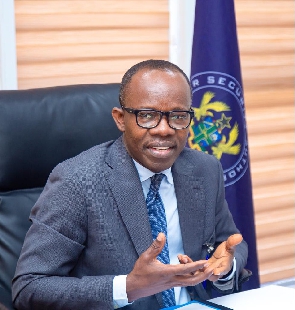The Cyber Security Authority (CSA) has been awarded Cyber Security Regulator of the year at the 12th Ghana Information Technology & Telecom Awards (GITTA). The CSA was established on October 2021 by section 2 of the Cybersecurity Act, 2020 (Act 1038) to regulate cybersecurity activities in the country; to promote the development of cybersecurity in the country and to provide for related matters. Cybersecurity Regulation in Ghana The dependence on digitalisation to transform Ghana’s economy comes with an increased risk of cyber threats and attacks on Critical infrastructure, businesses and individuals. The current digitalised and interconnected environment means that a single cybersecurity incident can affect an entire organisation, a whole nation and the world at large. As cybercrimes increase, cybersecurity services, establishments and professionals have become a critical solution for mitigating cybersecurity threats and vulnerabilities within Ghana’s fast developing digital ecosystem. It is therefore necessary that the industry is regulated to ensure that there are appropriate guidelines for practitioners and so that practitioners can be held accountable for their actions as part of efforts to control cybersecurity risks and to protect the interests and safety of Children, the Public, Businesses, and the Government. Globally, regulatory compliance has become one of the most effective and reliable strategies to mitigate cyber risks within the industry. The implementation of cybersecurity regulations is imperative to deal with both existing and emerging cyber threats which have the potential to undermine the digital dividends expected from our digital economy. The Cybersecurity Act, 2020 (Act 1038) provides the regulatory framework to promote cybersecurity development in the country. The Cyber Security Authority (CSA) has thus commenced a number of regulatory activities including the protection of Critical Information Infrastructures, pursuant to Sections 35 to 40 of Act 1038; licensing of Cybersecurity Service Providers pursuant to Sections of 49 to 56 and regulations on cybersecurity incident reporting and response, pursuant to Sections 41 to 48 of the Cybersecurity Act, 2022. Plans are advanced to ensure that starting January 2023, businesses, firms and individuals will not be able to offer cybersecurity services unless the entity or the individual is licensed or accredited by the Authority. Similarly designated Critical Information Infrastructure Owners will be subjected to mandatory audit and compliance checks against the Directive for the Protection of Critical Information Infrastructures which was adopted on October 1, 2021. In order for these regulations to be effectively enforced, the Cyber Security Authority has since the beginning of the year held collaborative meetings on the implementation of the Act with key stakeholders to ensure mutual understanding and commitment to implement the provisions of the Act. The internet offers several opportunities for improving the lives of children through access to information which is beneficial to their education, health and social well-being. Many children are, however, becoming prone to criminal online practices which are detrimental to their development. The Cyber Security Authority, as a regulator, is committed to ensuring the protection of children online per its mandate in the Cybersecurity Act 2020. In furtherance of the mandate, the Child Online Protection Framework has been revised to ensure the utmost safety of our children online. The Cyber Security Authority is being guided by the Governing Board and also through the Joint Cybersecurity Committee to approach cybersecurity regulations from a collaborative perspective. To improve awareness amongst key stakeholders on the regulatory provisions of the Cybersecurity Act, 2020 (Act 1038) and to create a culture of cybersecurity regulatory compliance, as well as effective operations and management of reporting and responding to cybersecurity incidents among stakeholders, especially the sectoral Computer Emergency Response Teams,. Subsequently, the 2022 edition of the National Cyber Security Awareness Month, which is celebrated in October every year is being organised under the theme, Regulating Cybersecurity: A Public-Private Sector Collaborative Approach, to build synergy among public and private sector institutions and stakeholders to effectively regulate the country’s cybersecurity. This was a follow up the previous year’s awareness month which was organised under the theme, Ghana's Cybersecurity Act, 2020; Its Implications and the Role of Stakeholders to mark the introduction of the landmark cybersecurity legislation to provide the legal backing to the country’s cybersecurity development. The Authority, working with other stakeholders, has so far engaged industry professionals, critical information infrastructure owners, the Bank Of Ghana and the Ghana Association of Banks, Civil Society Organisations, parents and children, international partners among others. Collaborations underpin the activities of the Cyber Security Authority in the execution of its mandate. This has been reflected in the inauguration of the Joint Cybersecurity Committee (JCC) under Section 13 of the Cybersecurity Act, 2020, to collaborate with the Authority and other sector institutions represented on the Committee for the implementation of relevant cybersecurity measures. The Industry Forum is also set to be established under Section 81 of the Act, as a platform to periodically bring private sector industry players together to discuss matters of common interest. Dr. Antwi-Boasiako receives Top 20 Tech Leaders Award The Ag. Director-General of the Cyber Security Authority, Dr. Albert Antwi-Boasiako, has received Top 20 Tech Leaders Award at the 12th Ghana Information Technology & Telecom Awards (GITTA). Prior to his appointment on October 1, 2021, he served as the National Cybersecurity Advisor and Head of the National Cyber Security Centre (NCSC) from July 2017 to September 2021 He led the institutionalisation of Ghana’s cybersecurity development which progressed from 32.6% in 2017 to 86.69% in 2020, according to the ITU’s Global Cybersecurity Index (GCI), with Ghana ranked 3rd in Africa and 43rd globally. In 2011, Dr. Antwi-Boasiako founded e-Crime Bureau, the first cybersecurity and digital forensics firm with a state-of-the-art e-Crime Lab to be established and operated in West Africa. Since 2014, He has served as an Expert with the Council of Europe’s Global Action on Cybercrime Extended (GLACY+) Project. In June 2021, he was recognised as the world’s 20th most Influential Security Executive in the Cybersecurity Category by IFSEC Global. He currently serves on the Independent Advisory Committee (IAC) of the Global Internet Forum to Counter Terrorism (GIFCT). He is a Bureau Member of the Cybercrime Convention Committee (T-CY) and is the Government of Ghana’s representative on ECOWAS’ Regional Technical Committee (RTC) on Cybersecurity. He is a Member of the Governing Boards of the National Information Technology Agency and the Cyber Security Authority.













